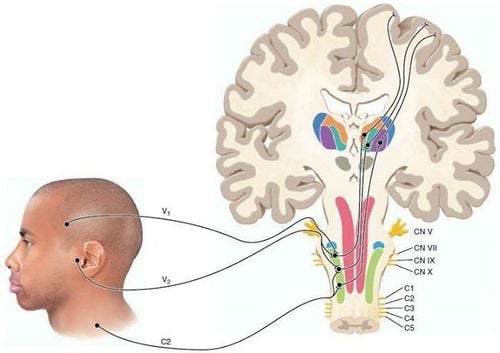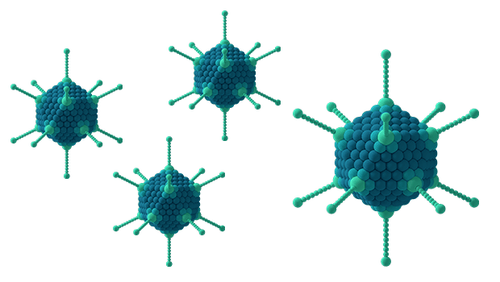This is an automatically translated article.
Central nervous system infections caused by many agents, including bacteria, fungi, spirochetes, parasites, viruses....Patients can get meningitis, encephalitis, abscesses brain...and have a high risk of death or increased burden of disease on the family and society.
1. Symptoms of central nervous system infection
Central nervous system infection is a medical emergency, therefore, prompt clinical and laboratory diagnostic steps should be taken to determine the underlying cause. When having a central nervous system infection, some common symptoms and signs are:
The patient has a headache, fever with sensory disturbances and stiff neck; There are Kernig and Brudzinski signs (+) as well as abnormalities in the cerebrospinal fluid. Besides, a number of other tests are used to diagnose the disease including: clinical examination, necessary tests, chest X-ray ...
Most complications of CNS infection are can cause high mortality and long-term health effects. Therefore, determining the exact cause for timely treatment is essential.

Nhiễm trùng thần kinh trung ương là một tình trạng cấp cứu
2. Central nervous system infections
Central nervous system infections caused by many pathogens. Those agents include bacteria, fungi, spirochetes, parasites, viruses... causing some diseases as follows:
Meningitis : This case usually manifests acutely within a few hours or 1 - 2 days after the onset of symptoms. Diagnosis is usually based on the results of smear and culture; Chronic meningitis: In this infection, symptoms persist. The most common causes of the disease are tuberculosis bacteria, fungi a) and spirochetes. Diagnosis is based on culture results or serological diagnosis; Aseptic meningitis: This is considered the most benign form, because it can go away on its own. Disease is usually viral, infectious mononucleosis or leptospira infection; Encephalitis: Symptoms of encephalitis are often manifested by sensory disturbances, convulsions. Cerebrospinal fluid examination may be normal or some lymphocytes may be present; Antibiotic-associated meningitis: In some cases, early antibiotic treatment alters CSF indices and neutrophil proliferation by a similar increase in lymphocytes. in cases of aseptic meningitis; Proximal reaction: It is the process of purulent infection very close to the central nervous system, thereby leading to inflammation such as white blood cells or proteins in the cerebrospinal fluid. These infections can be brain abscess, epidural abscess, subdural pus, mastoid otitis... Non-infectious meningoencephalitis: Meningeal irritation but normal cerebrospinal fluid may It can be caused by some infections such as pneumonia, dysentery, systemic lupus erythematosus, chemical or drug meningitis, carcinomatous meningitis, sarcoid disease, etc. may also appear irritating symptoms. Meningitis with increased white blood cell count and protein as well as normal or low sugar levels; Brain abscess: When there is a brain abscess, the patient will have symptoms such as vomiting, high fever that may cause convulsions, focal neurological signs or mental disturbances. Bacteria that cause brain abscesses are usually caused by staphylococcus aureus, gram(-) bacilli, streptococci,... Amebic encephalitis: The disease is caused by free amoeba and manifests with two syndromes. For this cause, there is no specific treatment. There are two types of this form: primary amoebic meningitis caused by Naegleria fowleri and amoebic granulomatous encephalitis caused by acanthamoeba species.

Nhiễm trùng hệ thần kinh trung ương do viêm màng não mủ
3. Specific diagnosis of central nervous system infections
When CNS infection is suspected, diagnostic steps should be taken to determine the specific cause. Typically, diagnostic steps include:
History and physical examination; Blood count test, blood culture; Brain tomography is indicated prior to CSF if there is suspicion of mass involvement based on coma, convulsions, or focal neurological signs; Cerebrospinal fluid culture; Chest X-ray film; Immunofluorescence and particle agglutination tests.
4. Treatment of Central Nervous System Infections
Central nervous system infection is a dangerous disease that affects both children and adults. The treatment of the disease is mainly supportive care and symptomatic treatment as follows:
Treatment of increased intracranial pressure due to cerebral edema should use measures to increase ventilation, mannitol infusion with a dosage of 25 - 50g very fast transmission). In addition, it is necessary to drain CSF through a catheter into the ventricles to control signs of cerebral edema and increased intracranial pressure. In some cases, dexamethasone should be used at a dose of 4mg (every 4-6 hours) to reduce cerebral edema; In cases of purulent meningitis causing central nervous system infection, immediate antibiotic treatment is required. The appropriate antibiotic treatment for each type of bacteria should be applied according to the regimen and according to each age group until the causative organism is identified. The duration of antibiotic treatment will depend on the causative agent, if the causative agent is H.influenzae and meningococcal disease, it should be treated for 7 days; for pneumococcus, it is for 10-14 days of antibiotic treatment. due to L.monocytogenes treatment 14 - 21 days and if caused by gram (-) bacilli, the treatment time is 21 days; For the treatment of brain abscess, including drainage (can open or aspirate the abscess) and combined with antibiotic treatment suitable for each type of bacteria isolated for a period of 3 - 4 weeks. Commonly used regimens for treatment include metronidazole at a dose of 500 mg IV every 8 hours and in combination with ceftriaxone 2g every 12 hours or ceftizoxime 2g IV every 8 hours. However, if the abscess is smaller than 2cm, the abscess cannot be drained, or if drainage will affect nerve function, then antibiotics should be used to treat within 6-8 weeks without drainage. . CNS infections often have a high risk of mortality and increase the burden of disease on families and society. According to research data, the leading cause of central nervous system infections in Vietnam is viruses such as Japanese encephalitis virus, Dengue virus, Herpes simplex virus,... Therefore, it can be prevented by Vaccination and appropriate treatment to protect your health as well as the health of the community. In addition, patients need to go to a reputable hospital to conduct examination and treatment as soon as there are signs of central nervous system infection. Currently, Vinmec International General Hospital is one of the leading prestigious hospitals in the country, trusted by a large number of patients for medical examination and treatment. Not only the physical system, modern equipment: 6 ultrasound rooms, 4 DR X-ray rooms (1 full-axis machine, 1 light machine, 1 general machine and 1 mammography machine) , 2 DR portable X-ray machines, 2 multi-row CT scanner rooms (1 128 rows and 1 16 arrays), 2 Magnetic resonance imaging rooms (1 3 Tesla and 1 1.5 Tesla), 1 room for 2 levels of interventional angiography and 1 room to measure bone mineral density.... Vinmec is also the place to gather a team of experienced doctors and nurses who will greatly assist in diagnosis and detection. early signs of abnormality in the patient's body. In particular, with a space designed according to 5-star hotel standards, Vinmec ensures to bring the patient the most comfort, friendliness and peace of mind.
Please dial HOTLINE for more information or register for an appointment HERE. Download MyVinmec app to make appointments faster and to manage your bookings easily.













